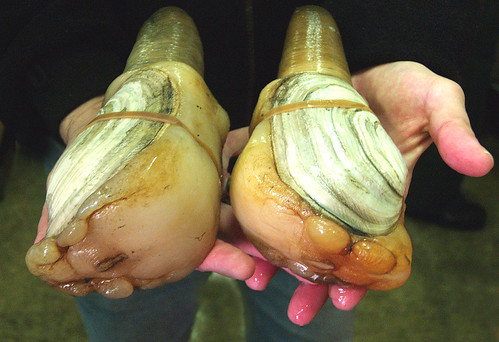
The coronavirus that emerged in late 2019 has infected more than 60,000 people, mostly in China. Though there haven’t been any confirmed cases in Alaska yet, some Alaskans — namely, geoduck clam fishermen — are feeling ripple effects from the epidemic.
It’s a weird-looking animal, the geoduck clam. It looks a little like a regular, everyday steamer clam — but much bigger.
“It’s two and a half to three pounds in weight and then the neck on it — it can be up to a three foot long neck,” Phil Doherty told Alaska’s Energy Desk Tuesday. He helps lead the Southeast Alaska Dive Fisheries Association. That’s an organization of fishermen who scour the seabed looking for the giant bivalves along the coast of the Pacific Northwest.
Though geoducks are native to the Western Hemisphere, Doherty said 95 percent of the catch gets sent across the Pacific.
Geoducks are a delicacy in China. And their undeniably phallic shape has given them a reputation as an aphrodisiac. But Doherty said that with the recent coronavirus outbreak, demand has plummeted.
“All of the restaurants, or the vast, vast majority of restaurants are closed,” Doherty said. “The vast majority of seafood markets are closed.”
And there’s another wrinkle.
“It’s all a live market,” Doherty said. “And that’s where, kind of, the rub comes in.”
So that means that geoducks can’t exactly be frozen or canned and saved for later.
“You’re only looking at about a four-day window between harvesting the geoduck and wanting them sold,” said dive fisherman Jeremy Leighton in a Tuesday interview.
He says he spends most Wednesdays and Thursdays during the winter racing to fill his boat with up to a thousand pounds of geoduck clams. He sells his catch to buyers on the docks here in Ketchikan.
But lately, he hasn’t been fishing.
“Well, most of the divers are just uncertain about what’s going to happen,” he said. “We’re all sitting on the beach, hoping to go to work.”
Leighton said he can usually sell his haul for $5 to $10 per pound, sometimes more. But with the Chinese market essentially shut down, they’re going for about $1 a pound.
So, in January, divers held an emergency meeting of the geoduck committee — that’s a group of 20 undersea fishermen that — to talk about what to do next.
Leighton chairs the committee, and he said it was a tough call.
“Some guys are broke now, and they want to go to work,” he said.
But he said a majority of divers decided that with prices so low, it just didn’t make sense.
Leighton says he’s seen the geoduck fishery shut down before — like during the severe acute respiratory syndrome outbreak in the early 2000s. But he said the scale and open-endedness of this outbreak have divers worried.
“To all of a sudden just shut down, everybody’s kind of in shock, you know, not expecting it,” he said, “and they’re just like, ‘okay, well, now what do we do?’”
Leighton said he’s got enough savings to scrape by until next winter if he has to. He said some divers will likely take their boats south to dive for sea urchins.
But for now, all Leighton can do is sit on the beach and hope he can get back to work on the seafloor soon.
The geoduck committee meets again Thursday, Feb. 20.
This story was produced as part of a collaboration between KRBD and Alaska’s Energy Desk.





